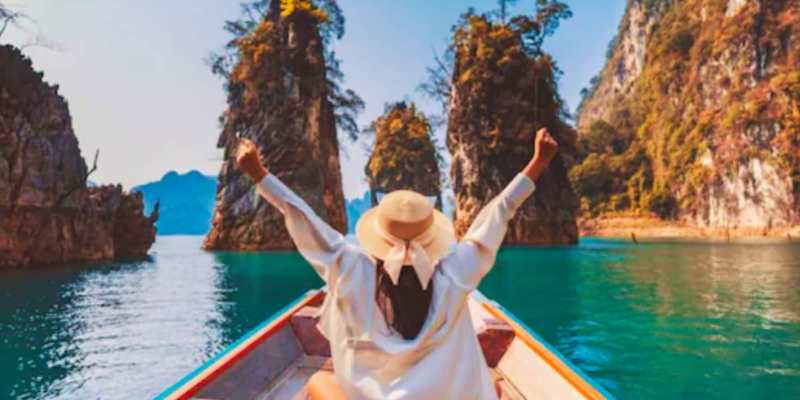Last Updated:May 04, 2025, 07:58 IST
Experiential travel isn’t just a trend—it’s a transformative movement redefining how we connect with places, people, and purpose.
 From heritage cruises and cultural rituals to music festivals and volunteering, today’s travellers are looking for something deeper.
From heritage cruises and cultural rituals to music festivals and volunteering, today’s travellers are looking for something deeper.
In a world where travel is no longer just about ticking off landmarks or lounging at cookie-cutter resorts, a profound shift is underway. Experiential travel—defined by its focus on immersion, authenticity, and meaning—is rapidly reshaping the tourism landscape. From heritage cruises and cultural rituals to music festivals and volunteering, today’s travellers are looking for something deeper. But is it just a trend or a long-term movement? We spoke to travel leaders across the country to understand why experiential travel isn’t the next big thing—it is the thing.
“Experiential travel marks a powerful evolution in how people explore the world,” says Raj Singh, Founder & Chairman of Antara Cruises – Heritage River Journeys Pvt Ltd. “Today’s conscious traveller seeks more than just a destination. They seek connection, meaning, and purpose.” Singh explains how Antara Cruises curates river journeys that engage travellers with regional heritage, riverside communities, and local cuisines—all while supporting sustainable tourism and the preservation of cultural traditions. “It reflects a shift toward responsible exploration that honours local culture, supports ecosystems, and redefines luxury as a mindful, meaningful connection with people and places.”
Recommended Stories
This evolution is not limited to niche experiences; it’s being embraced on an institutional level too. According to Kedar Naik, Director of Tourism, Government of Goa, “Experiential travel isn’t just the next big trend—it’s the future of meaningful tourism.” Goa Tourism has been actively pivoting toward immersive and regenerative experiences through curated hinterland trails, spiritual circuits like the Ekadasha Teertha, heritage walks, and community-led homestays. “We want every traveller to leave with a sense of place, a local connection, and a commitment to preserve the beauty they experience,” says Naik.
From the government to the grassroots, the shift is palpable. Alok K Singh, Chairman and CEO of Travomint, notes that travellers today are choosing engagement over escapism. “The desire isn’t just to visit a place, but to truly engross in it. There’s a heightening appreciation for local culture, human connection, and immersive storytelling.” Whether it’s learning crafts or sharing meals with local families, Singh emphasizes that authenticity is becoming the cornerstone of modern travel.
This insight is echoed by Mithun Jha, Director at Reservations Deal, who notes a surge in demand for “immersive and alluring activities along with personalized experiences.” According to Jha, data shows that travellers are increasingly choosing cooking classes, village tours, and offbeat explorations over lavish hotel stays. “People are actively choosing partaking over profligacy. Experiential travel offers higher emotional ROI, making it an increasingly opted model in the evolving travel era,” he says.
At the heart of this transformation are young travellers, especially Gen Z, who are driving the demand for experiential offerings. Pallavi Agarwal, Founder and CEO of goSTOPS, sees this as more than a trend—it’s a movement. “Gen Z craves experiences. They want to create long-lasting memories and find meaning in travel. We’ve noticed travellers curating their itineraries based on conversations with fellow guests, not internet-curated lists.”
Even the way people plan travel is changing. Gaurav Malik, Country Director for India, Sri Lanka, and Nepal at Agoda, notes a sharp rise in travel linked to cultural events and festivals. “Experiential travel is transforming how Indians explore. More travellers are seeking immersive connections through music festivals, concerts, and cultural events.” He cites Coldplay’s upcoming concert in Mumbai as a prime example, which led to a 33-fold spike in accommodation searches on Agoda. “Such events not only boost tourism but enhance India’s cultural appeal,” he adds.
As travel becomes more individualistic, the appeal lies in moments that are unscripted and soulful. Rahul Dhawan, Sales Director at Dial for Holidays LLP, observes that people aren’t looking to escape anymore—they’re looking to connect. “Whether it’s learning from a local artisan, joining a small ritual, or living the slow life in a rural community, it’s about the deep involvement and not just about the distance travelled,” he says. Dhawan believes experiential travel offers something grounding and emotionally nourishing in an increasingly digitized world.
Summing it up with flair, Darsi Shield, Founder of Tuesday Tickets, says, “Vacations are having a glow-up. It’s no longer about touristy spots—it’s about stories, not status. People want moments that feel candid, primal, and unforgettable.” Social media, she adds, is fuelling this demand by showcasing experiences that are unique, shareable, and soul-stirring.
So, is experiential travel the next big trend? According to the experts, it’s not just the future—it’s already the present. And as travellers continue to prioritize meaning over materialism, the tourism industry is reshaping itself to deliver journeys that are as enriching for the soul as they are for the selfie.
The News18 Lifestyle section brings you the latest on health, fashion, travel, food, and culture — with wellness tips, celebrity style, travel inspiration, and recipes. Also Download the News18 App to stay updated!
Location : First Published:News lifestyle » travel Is Experiential Travel the Future of Tourism? Industry Experts Say It’s Already Here




